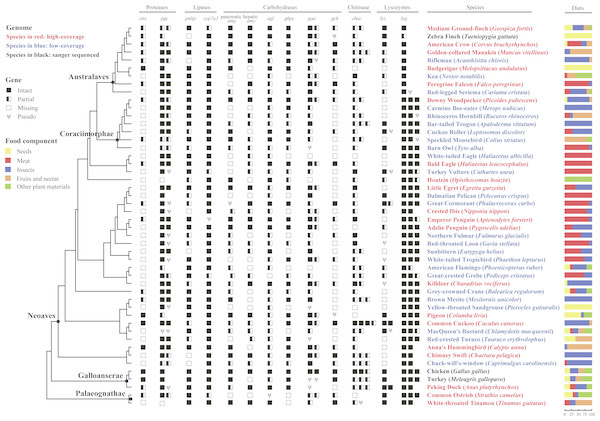
As the most species-rich class of tetrapod vertebrates, Aves possesses diverse feeding habits, with multiple origins of insectivory, carnivory, frugivory, nectarivory, granivory and omnivory. Since digestive enzymes mediate and limit energy and nutrient uptake, we hypothesized that genes encoding digestive enzymes have undergone adaptive evolution in birds. To test this general hypothesis, we identified 16 digestive enzyme genes (including seven carbohydrase genes (hepatic amy, pancreatic amy, salivary amy, agl, g6pc, gaa and gck), three lipase genes (cyp7a1, lipf and pnlip), two protease genes (ctrc and pgc), two lysozyme genes (lyz and lyg) and two chitinase genes (chia and chit1)) from the available genomes of 48 bird species. Among these 16 genes, three (salivary amy, lipf and chit1) were not found in all 48 avian genomes, which was further supported by our synteny analysis. Of the remaining 13 genes, eight were single-copy and five (chia, gaa, lyz, lyg and pgc) were multi-copy. Moreover, the multi-copy genes gaa, lyg and pgc were predicted to exhibit functional divergence among copies. Positively selected sites were detected in all of the analyzed digestive enzyme genes, except agl, g6pc, gaa and gck, suggesting that different diets may have favored differences in catalytic capacities of these enzymes. Furthermore, the analysis also revealed that the pancreatic amylase gene and one of the lipase genes (cyp7a1) have higher ω (the ratio of nonsynonymous to the synonymous substitution rates) values in species consuming a larger amount of seeds and meat, respectively, indicating an intense selection. In addition, the gck carbohydrase gene in species consuming a smaller amount of seeds, fruits or nectar, and a lipase gene (pnlip) in species consuming less meat were found to be under relaxed selection. Thus, gene loss, gene duplication, functional divergence, positive selection and relaxed selection have collectively shaped the evolution of digestive enzymes in birds, and the evolutionary flexibility of these enzymes may have facilitated their dietary diversification.
Δεν υπάρχουν σχόλια:
Δημοσίευση σχολίου